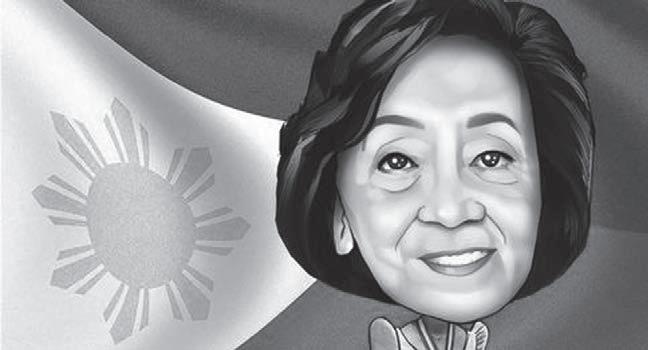
3 minute read
Those women of peace and diplomacy
Tito Genova Valiente annoTaTions
lomatic relations of the Philippines with Hungary and East Germany. She was at Bonn as well. She then became an envoy to Australia, Switzerland, Germany, Romania, and Hungary.
‘Isn’t that Delia Albert?”
“the former Ambassador?
“Also secretary of Foreign Affairs…” it was neni sta. Romana-Cruz, former Chair of the national Book Development Board, who initiated the inquiry as we both looked at the formal and elegant lady seated at the sofa at the center of this penthouse. It was the official launch of the book, Hindi Pasisiil ang Pagsibol (literally, “no one could stop spring,” a translation that as the afternoon went by became “nothing can stop the flower from blooming.”
At the center of the launch was the person gifted with the vision to consider deepening the relationships between countries—the Philippines and Hungary in this regard— through literature and translations. That person is Ambassador of Hungary to the Philippines, Dr. Titanilla Toth. Working with the Ateneo de Naga University Press and its director, Kristian Sendon Cordero, she organized a project where selected poems from her country’s pre-eminent poets, including its national poet Sandor Petofi, were translated into Filipino and other Bikol languages.
In her speech, Toth articulated the function of poetry as not only serving as a bridge between (or even among) countries but also as “flowers that bloom in the garden of friendship.”
Metaphors of goodwill were not only given focus that day; the afternoon was a memory in bloom. There was the presence of a woman who was the first diplomat to open relationships in European countries that were not only othered but also challenged in terms of their ideologies.
“Yes, I think that’s Ambassador Delia Albert,” I responded. She was a prominent face during the years that she was an ambassador and, later, secretary of foreign affairs. No one could forget a leader if she was the only woman in a male-dominated world. The world of diplomacy then had always been a male bastion that no one bothered to change the gender of that position: Ambassador never became Ambassadress. Unless you are representing goodwill in small events but never if you are that kind of individual expected to be at home between the boundaries of peace and a German, surnamed “Albert” after being made to wait for three years.
That afternoon, at the Penthouse of Del Rosario Law Center in Bonifacio Global City, Delia Albert was an important presence. As the event was coming to an end, we found ourselves in front of her. We stood up to welcome her and began a conversation that saw us all ignoring the sofa, listening to her recall her days as a diplomat.
She talked about how the diplomatic processes had changed because of technology. Without the Internet and the accompanying development in social media, the use of mobile phones and the new protocol on email, there was only personal and face-to-face interactions. Then there was the gender concern. From her we learned how she became the first female foreign minister in Asia and how this, in so many ways, changed the global political landscape.
“And he waited?” I cheekily asked. “He waited,” she firmly answered.
As the conversation progressed, I noticed Ambassador Titanilla Toth approached us. She became part of the listeners, commenting every now and then about how Ambassador Albert made the event important. Here we were launching a book on poetry and observing the 50th anniversary of diplomatic relations and here was the woman diplomat who also made history by having the honor of opening the first diplomatic post in Hungary. Gilding this “coincidence” was the fact of the Ambassador of Hungary to the country being a woman. Ambassador Albert was proud of many things, among them a book she wrote about the women who pioneered work in the field of foreign affairs and diplomacy. The book was “Women in Diplomacy: The Remarkable Ambassadors in the Philippine Service.”
Introducing myself as a columnist for BusinessMirror, my affiliation seemed to bring back fond memories of a writer who wrote about her. Delia Albert and I searched our minds for that writer. She remembered the writer as having passed on and the wonderful things that writer essayed in that article. We searched our minds for the name of the writer who described her as “woman power in the foreign service,” and a diplomat who “gleams as gold, shines as silver.” war, negotiations and compromise, raw strength and gentle persuasion.
The writer was our very own Recto Mercene.
Delia Albert was all of these: She was what we call a “career diplomat,” an individual who studied and worked her way up to be one. Her career began in the ’60s, in the Office of the secretary of Foreign Affairs. She was part of the delegation to the United Nations in Geneva, Switzerland from 1969 to 1975. She was there at the embassy of Romania, from which she managed the dip-
Not every topic involved the diplomatese and the somber: Ambassador Albert with that charming grin narrated how the unequal treatment of diplomats extended to the matter of finding partners. While it was no big deal for male ambassadors to be married to foreigners, it was such an issue for women diplomats to be involved with foreigners. “I changed all that,” with a glint in her eyes, sharing with us that lovely part of her person. She confessed to marrying







